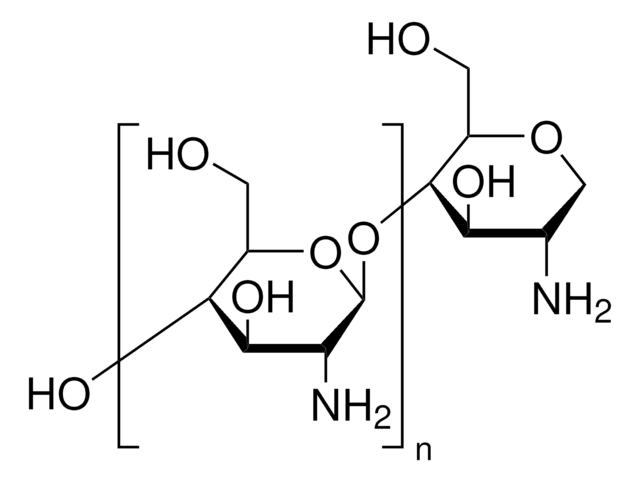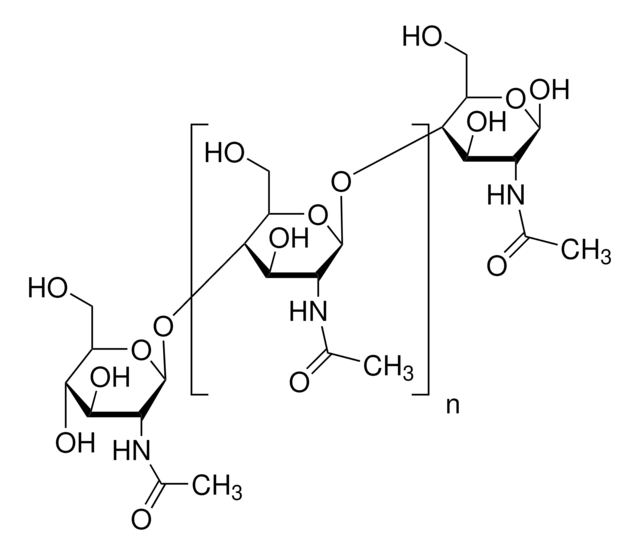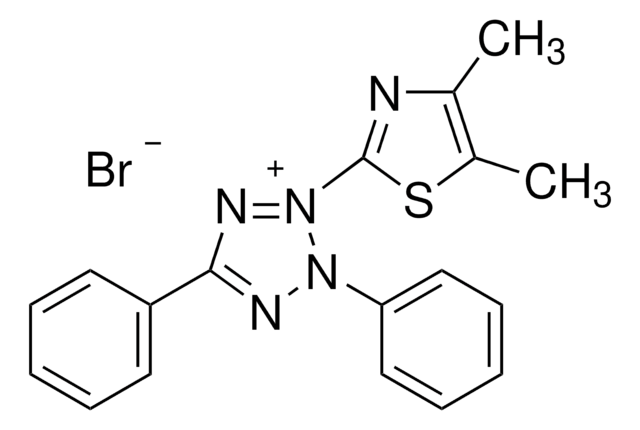C3646
Chitosan
from shrimp shells, ≥75% (deacetylated)
Synonym(e):
Deacetyliertes Chitin, Poly(D-glucosamin)
About This Item
Empfohlene Produkte
Biologische Quelle
shrimp shells
Qualitätsniveau
Assay
≥75% (deacetylated)
Form
powder or flakes
Farbe
white to beige
mp (Schmelzpunkt)
102.5 °C ((216.5 °F ))
Löslichkeit
acetic acid: water: 10 mg/mL, slightly hazy to hazy (with extensive sonication)
H2O: insoluble
organic solvents: insoluble
Schüttdichte
0.15‑0.3 g/cm3
Lagertemp.
room temp
InChI
1S/C56H103N9O39/c1-87-56(86)65-28-38(84)46(19(10-74)96-55(28)104-45-18(9-73)95-49(27(64)37(45)83)97-39-12(3-67)88-47(85)20(57)31(39)77)103-54-26(63)36(82)44(17(8-72)94-54)102-53-25(62)35(81)43(16(7-71)93-53)101-52-24(61)34(80)42(15(6-70)92-52)100-51-23(60)33(79)41(14(5-69)91-51)99-50-22(59)32(78)40(13(4-68)90-50)98-48-21(58)30(76)29(75)11(2-66)89-48/h11-55,66-85H,2-10,57-64H2,1H3,(H,65,86)/t11-,12-,13-,14-,15-,16-,17-,18-,19-,20-,21-,22-,23-,24-,25-,26-,27-,28-,29-,30-,31-,32-,33-,34-,35-,36-,37-,38-,39-,40-,41-,42-,43-,44-,45-,46-,47-,48+,49+,50+,51+,52+,53+,54+,55+/m1/s1
InChIKey
FLASNYPZGWUPSU-SICDJOISSA-N
Suchen Sie nach ähnlichen Produkten? Aufrufen Leitfaden zum Produktvergleich
Anwendung
Leistungsmerkmale und Vorteile
Qualität
Angaben zur Herstellung
Hinweis zur Analyse
Sonstige Hinweise
Lagerklassenschlüssel
11 - Combustible Solids
WGK
nwg
Flammpunkt (°F)
Not applicable
Flammpunkt (°C)
Not applicable
Persönliche Schutzausrüstung
Eyeshields, Gloves, type N95 (US)
Analysenzertifikate (COA)
Suchen Sie nach Analysenzertifikate (COA), indem Sie die Lot-/Chargennummer des Produkts eingeben. Lot- und Chargennummern sind auf dem Produktetikett hinter den Wörtern ‘Lot’ oder ‘Batch’ (Lot oder Charge) zu finden.
Besitzen Sie dieses Produkt bereits?
In der Dokumentenbibliothek finden Sie die Dokumentation zu den Produkten, die Sie kürzlich erworben haben.
Artikel
Microparticles with controlled size and morphology are of significant interest in the fields of drug delivery and biopharmaceuticals.
Enzymatic Assay of Chitosanase from Streptomyces Species
Unser Team von Wissenschaftlern verfügt über Erfahrung in allen Forschungsbereichen einschließlich Life Science, Materialwissenschaften, chemischer Synthese, Chromatographie, Analytik und vielen mehr..
Setzen Sie sich mit dem technischen Dienst in Verbindung.




